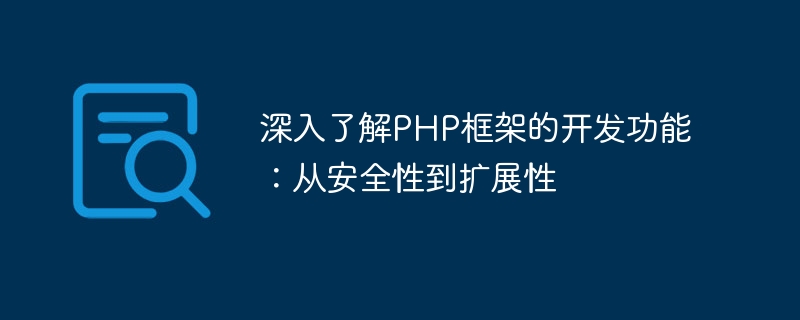Home >Backend Development >PHP Tutorial >A deep dive into the development capabilities of PHP frameworks: from security to scalability
A deep dive into the development capabilities of PHP frameworks: from security to scalability
- WBOYWBOYWBOYWBOYWBOYWBOYWBOYWBOYWBOYWBOYWBOYWBOYWBOriginal
- 2023-11-27 12:07:081189browse

In contemporary web development, the PHP framework has become an indispensable part. PHP frameworks provide web developers with a flexible and powerful tool that improves code maintainability, reusability, and performance. At the same time, the PHP framework also provides better security and scalability. This article will provide an in-depth understanding of the development functions of the PHP framework from these two aspects.
Security
Security is one of the most important aspects of web development, as web applications face a variety of security threats almost every day. PHP frameworks usually give full consideration to security during the development process to ensure the security and reliability of web applications. Here are some ways how PHP frameworks can improve security:
- Preventing SQL Injection Attacks
SQL injection attacks are one of the most common web security issues. PHP frameworks usually use parameter binding, prepared statements, etc. to process SQL queries to avoid SQL injection attacks.
- Prevent cross-site scripting attacks
Cross-site scripting attacks refer to attackers injecting malicious script code into web applications in order to deceive users and steal user data wait. PHP frameworks usually provide XSS filters to detect and filter potentially malicious scripts.
- HTTP/HTTPS security
On the Internet, HTTP connections are not secure. Therefore, the PHP framework can provide HTTPS protocol support to protect the security and integrity of sensitive data transmission.
- Forced session management
The PHP framework can enforce the use of session management to ensure that each user in the web application has his or her unique session ID and associate it with User authentication and authorization are bound to protect the security of user data.
Extensibility
Extensibility refers to the ability to expand with the needs of a web application. PHP frameworks usually provide an architecture that is easy to modify and extend to add new functionality without affecting the operation of the web application. Here are some ways how PHP frameworks improve scalability:
- Modularity
PHP frameworks often incorporate modular architectures such as the MVC (Model View Controller) pattern , to facilitate the expansion and management of web applications.
- Plug-ins/Extensions
PHP frameworks usually provide plug-in and extension mechanisms that allow developers to add new functionality without modifying the original code. This approach keeps the code maintainable and extensible.
- Configurability
PHP frameworks usually provide configurable options that allow developers to change the behavior of the framework without modifying the code. This approach can greatly simplify the development process and improve development efficiency.
- Third-party library support
PHP frameworks usually provide support for third-party libraries, allowing developers to use predefined code snippets to help quickly develop new features. This approach can reduce the workload of some common tasks and increase productivity.
Summary
The PHP framework provides web developers with a flexible and powerful tool to improve code maintainability, reusability, and performance. The PHP framework also provides better security and scalability to ensure the security and reliability of web applications and expand their functionality as needs change. Even so, the PHP framework is not a panacea, so software developers still need to choose a specific PHP framework based on actual needs to achieve the best results.
The above is the detailed content of A deep dive into the development capabilities of PHP frameworks: from security to scalability. For more information, please follow other related articles on the PHP Chinese website!

